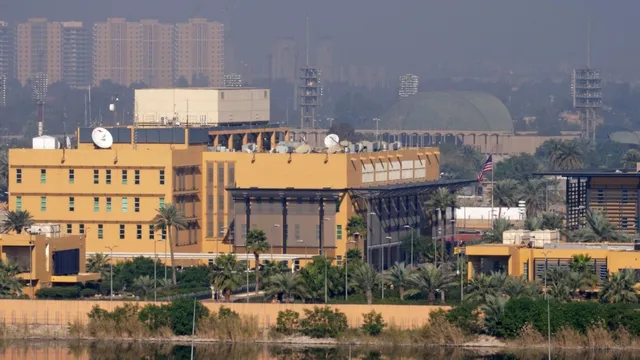
U.S. evacuates nonessential staff amid rising tensions in Baghdad
2025-06-12 00:15- The State Department ordered nonessential staff from the U.S. Embassy in Baghdad to leave due to rising security risks.
- This decision is part of the U.S. government's commitment to ensuring the safety of its personnel amid increasing regional tensions.
- The partial evacuations signify a proactive response to deteriorating conditions in the Middle East.
Express your sentiment!
Insights
In early June 2025, the United States took precautionary measures in response to increasing security risks in the Middle East, particularly regarding the situation in Iraq. The State Department made the decision to partially evacuate nonessential personnel from the U.S. Embassy in Baghdad, based on a thorough risk assessment aimed at ensuring the safety of American citizens abroad. This decision reflects the U.S. government's ongoing commitment to maintaining a safe environment for its diplomats and citizens amid escalating tensions in the region. The U.S. military was not involved in the transport of these personnel, but plans could change if necessary. The decision came during a period when regional stability was under threat due to the ongoing conflict between Israel and Hamas in Gaza, alongside stalled negotiations with Iran regarding its nuclear program. Tensions had been mounting, prompting U.S. officials to prioritize the safety of their diplomatic staff. Secretary of Defense Pete Hegseth had also authorized the voluntary evacuation of military dependents from various locations throughout the Middle East as a further precautionary measure, indicating a recognition of the broader risks present in the region. Despite the orders for partial evacuations from Baghdad, the U.S. Embassy in Kuwait stated that it remained fully operational without any changes to its staffing. However, the situation continues to evolve, with U.S. Central Command monitoring the increased threat level closely. The heightened concerns in the region stemmed from not only the military conflict but also the stalled diplomatic efforts with Iran, which have left many apprehensive about potential military escalations. As the situation continues to develop, officials have emphasized that these actions are in the best interest of both American citizens and U.S. interests overseas. The ongoing instability and threats posed by various factions have rendered a calculated response necessary, and the decision to evacuate nonessential personnel exemplifies a proactive approach to managing these challenges.
Contexts
The Israel-Hamas conflict has significantly impacted U.S. relations in the Middle East, shaping diplomatic, military, and economic ties. Over decades, the U.S. has maintained a strong alliance with Israel, viewing it as a key partner in promoting stability and democratic values in a tumultuous region. The U.S. support for Israel is further fueled by historical ties, shared democratic ideals, and substantial domestic pro-Israel lobbying groups that advocate for robust military and economic support. Conversely, the ongoing conflict between Israel and Hamas, particularly in the Gaza Strip, raises complex challenges for U.S. diplomacy, as the country must also address the concerns and humanitarian needs of Palestinian people, who are often caught in the crossfire of military operations. This duality creates a balancing act for the U.S. administration, where it must navigate supportive relations with Israel while taking steps toward Palestinian rights and aspirations for statehood. The reactions of the U.S. government to escalated violence often reflect the broader geopolitical ramifications of any military engagement. Congressional responses, public opinion, and advocacy groups can shape U.S. policy quickly, especially during times of pronounced conflict. The Obama administration's approach to the 2014 Gaza war exemplified a more cautious engagement, emphasizing diplomacy. In contrast, more recent administrations have seen variations in this dynamic, with some leaders taking a firmer stance in support of Israel during escalations. Such responses can impact international perceptions of the U.S., calling into question its role as a mediator in Israel-Palestinian peace efforts and its overall credibility in championing human rights amid military campaigns. Moreover, the conflict not only affects immediate diplomatic interactions but also has broader implications for U.S. foreign policy in the Middle East. The emergence of regional alliances, particularly between Israel and certain Arab states like the UAE and Bahrain following the Abraham Accords, demonstrates a shifting landscape in U.S. relations. This new dynamic shows that countries in the region can often prioritize shared security concerns (such as countering Iranian influence) over traditional animosities. However, continual conflict exacerbates existing tensions and can complicate these relationships, particularly if there is a perceived lack of fairness in U.S. policies, which may drive disillusioned populations towards anti-American sentiments. Furthermore, the Israel-Hamas conflict poses economic implications for U.S. interests, especially regarding aid and defense spending. The U.S. allocates billions in military assistance to Israel, which is often justified as a means of ensuring its security in a hostile region. As humanitarian crises unfold due to prolonged conflicts, pressure can mount from various domestic and international sectors demanding a reassessment of aid allocations to tip the balance towards humanitarian assistance in Gaza. Ultimately, the Israel-Hamas conflict remains a pivotal factor influencing U.S. relations in the Middle East, shaping everything from alliances to public perception, and will continue to be a test of American foreign policy in the years to come.